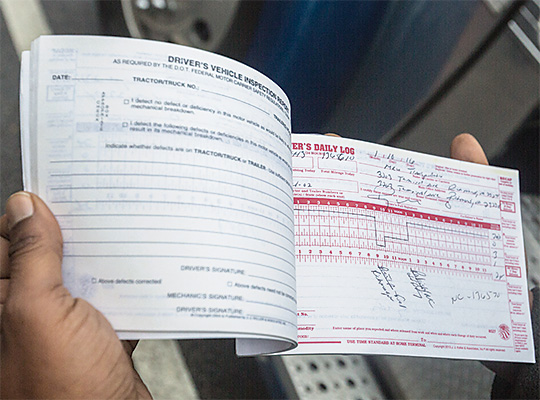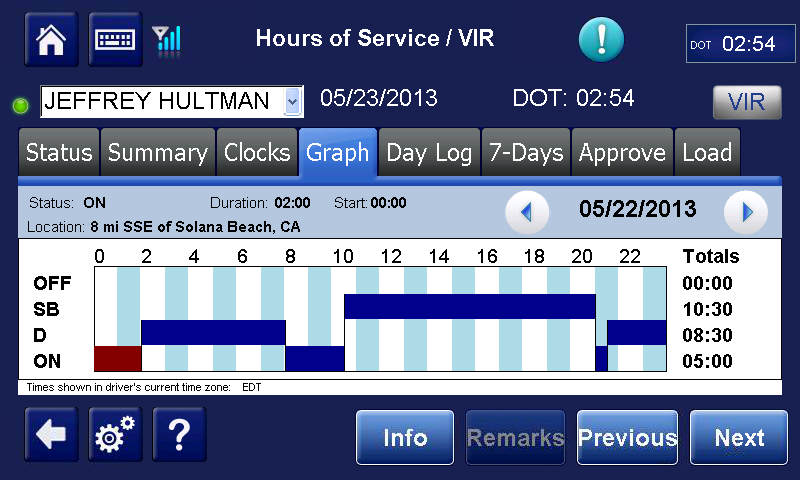Electronic log mandate is finally on the books
February 26, 2016

In an era of smartphones, online banking and self-checkout kiosks, the paper logbooks truck and bus drivers keep to attest to their compliance with federal work rules are decidedly antiquated.
Finally, that's set to change.
More than 29 years after the Institute first petitioned the U.S. Department of Transportation to ditch paper logs in favor of automatic devices to record when a truck is moving, a mandate for electronic logging devices (ELD) is on the books. The rule aims to reduce fatigue-related crashes by drivers who may have doctored their paper logs to hide the real hours they have driven beyond what regulations allow.
"Since 1938, complex, on-duty/off-duty logs for truck and bus drivers were made with pencil and paper, virtually impossible to verify," said U.S. Transportation Secretary Anthony Foxx in announcing the rule on Dec. 10, 2015.
"This automated technology not only brings logging records into the modern age, it also allows roadside safety inspectors to unmask violations of federal law that put lives at risk," Foxx said.

Studies of long-distance truckers indicate that work rules commonly are flouted. Hours-of-service regulations govern how much time truck drivers can be on the road and when and for how long they need to rest. Although the current regulations allow too much time on the road — up to 11 hours a shift and up to 77 hours over 7 days — better compliance would likely reduce the number of tired drivers.
Requiring all truckers to use ELDs also levels the playing field by removing any competitive advantage to violating work rules compared with carriers who follow the rules, industry representatives say. In turn, that should help ensure that drivers overall are more rested and alert when they return to the road.
If the rule survives a legal challenge, commercial truck and bus drivers currently required to record their duty hours must start using compliant ELDs by December 2017. The rule exempts short-haul drivers who use time cards. Drivers of vehicles made before 2000 can continue to use paper logbooks. Carriers who already use ELDs that don't meet the new technology requirements have until December 2019 to upgrade to compliant systems.
"This is a game-changer for the safety of our highways," says Adrian Lund, who is president of the Institute.
Lund was there at the beginning when the Institute asked the U.S. Department of Transportation in October 1986 for an automatic recorder mandate to help enforce truck driver work rules. Two months later, the Department of Transportation denied the petition.
"We made a reasonable request, based on solid research. It should have been an easy win," Lund recalls. "Then every time it looked as if an electronic log requirement was gaining traction, trucking industry lobbyists, federal regulators or judges stalled the progress. And all the while people were being killed in crashes involving truckers who were too tired to be on the road."
The ELD mandate covers an estimated 3 million drivers and is expected to save 26 lives and prevent 562 injuries on average per year, the Federal Motor Carrier Safety Administration (FMCSA) says. Cost savings for the trucking industry should top $1 billion a year, mainly by reducing paperwork, the agency says.
The American Trucking Associations, which had once opposed a mandate for electronic recorders, lauded the rule in a Dec. 10 tweet: "Today is a historic day for #trucking as FMCSA has issued its ELD rule. Technology to improve safety & efficiency."
ATA President Bill Graves added, "This regulation will change the trucking industry — for the better — forever."
In 2005, the trade group softened its stance on mandatory ELDs, then known as electronic onboard recorders, and in 2010 made them a top legislative priority.
Still, not all truckers are on board. Days after FMCSA's announcement, the Owner-Operator Independent Drivers Association filed a lawsuit to block the rule's implementation. The group, which thwarted a prior ELD mandate, vowed "to fight it with everything we have available."
A federal appeals court struck down a 2010 rule after the owner-operator group challenged it on the grounds that carriers might use recorders to harass drivers by pressuring them to drive when they are tired.
FMCSA went back to the drawing board and in March 2014 issued a revised proposal that explicitly prohibits such harassment. December's regulation is the result.
Automated logging systems have been around for decades, and many carriers use them to collect fleet data. ELDs monitor engine hours, vehicle movement, miles driven and location information. They can be standalone telematics devices or software applications installed on laptops, smartphones, tablets or other wireless devices.
The rule stipulates that ELDs be able to transfer data wirelessly or locally using Bluetooth or a USB port. Drivers must be able to show roadside inspectors their hours-of-service logs, either on a display screen or a paper printout.
Canada- and Mexico-based truckers also will have to comply when operating on U.S. roads. Canada doesn't yet require ELDs. The Canadian Trucking Alliance, a federation of provincial trucking associations, has lobbied for a mandate for more than a decade, and the government last year signaled its intention to move ahead with one. ELDs aren't required in Mexico, where truck drivers aren't covered by hours-of-service regulations either. The European Union mandated electronic logs in 2006, replacing a prior rule on the books since the 1980s requiring large trucks to be equipped with mechanical tachographs to record vehicle travel hours.


Long road to mandate for electronic logging devices
| 1971 | Federal legislation introduced to require all trucks and buses to be equipped with tachographs |
| 1986 | IIHS petitions FHWA for mandate |
| 1987 | IIHS asks FHWA to reconsider denial of mandate |
| 1989 | IIHS petitions FHWA for mandate for carriers transporting hazardous materials |
| 1995 | IIHS and 5 other safety groups petition FHWA for mandate |
| 2000 | FMCSA proposes new trucker work rules, including ELD mandate |
| 2003 | FMCSA announces new rule increasing allowable driving time but no ELD mandate |
| 2005 | IIHS petitions for reconsideration of 2003 work rule and lack of ELD mandate |
| 2010 | FMCSA mandates ELDs for carriers with egregious violation history, effective 2012 |
| January 2011 | FMCSA proposes comprehensive mandate |
| August 2011 | Federal appeals court rejects limited ELD mandate due to lack of driver protection from harassment |
| 2014 | FMCSA re-proposes mandate |
| December 2015 | FMCSA issues final rule mandating ELDs by December 2017 for all commercial truck and bus drivers required to complete paper logbooks |
| Owner-Operator Independent Drivers Association files lawsuit to block ELD mandate |